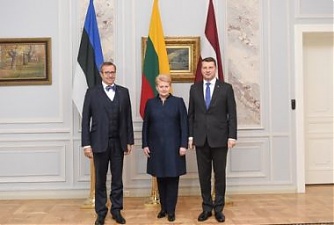EU – Baltic States, Legislation, Security, Society, Transport
International Internet Magazine. Baltic States news & analytics
Tuesday, 23.04.2024, 20:38
Baltics won't agree to additional refugee quotas unless external borders are strengthened
 Print version
Print version |
|---|
| Toomas Hendrik Ilves, Dalia Grybauskaite and Raimonds Vejonis in Palanga. Photo: lrp.lt |
"We have an agreement previously done on some quota and all of us are sticking to our obligations, but it is too early to talk about something more before everything what was agreed is fulfilled, I mean external borders," Lithuanian President Dalia Grybauskaite said in a joint press conference in the resort of Palanga.
"In Latvia's case, our commitments to implement our existing obligations on refugee relocations remain (in place), but if Europe does not do all the agreed homework on strengthening external borders, external return mechanisms, fight with illegal trafficking, we are not ready to continue discussions about new obligations, about new numbers for relocation," Latvian President Raimonds Vejonis said.
With the Schengen area under threat, the European Union should direct its attention to strengthening its external borders, Baltic foreign ministers said in Vilnius on Friday.
"I think what I see now, especially after the terror attacks in Paris, (including) a kind of hasty calls to erect internal borders back in Europe, simply is not acceptable. Migration is also adding to the pressure. I think that what we really need to do is to protect the external borders of the European Union," Latvian Foreign Minister Edgars Rinkevics said.
"In discussing the Schengen area future, I would concentrate the whole energy to actually strengthening our external borders. I do agree that if we lose Schengen, we lose one of our fundamental freedoms," he said, adding that the whole European could be in jeopardy.
Estonian Foreign Minister Marina Kaljurand said that some countries might temporarily reinstate their border controls, but the Schengen agreement was and would remain one of the EU's key objectives.
Lithuanian Foreign Minister Linas Linkevicius said that refugee flows in Europe could be controlled if the whole mechanism functioned properly.
"The protection of external borders has to be much more effective. We need to control refugee flows by separating genuine refugees (...) from economic migrants. We must ensure the efficient functioning of the readmission mechanism. If any of these elements fails, this will pose a huge challenge and threat to the Schengen area. None of us wants this and we have to mobilize to prevent this from happening," he said.
The three Baltic foreign ministers participated in the Baltic Assembly's plenary meeting in Vilnius.








 «The Baltic Course» Is Sold and Stays in Business!
«The Baltic Course» Is Sold and Stays in Business!

